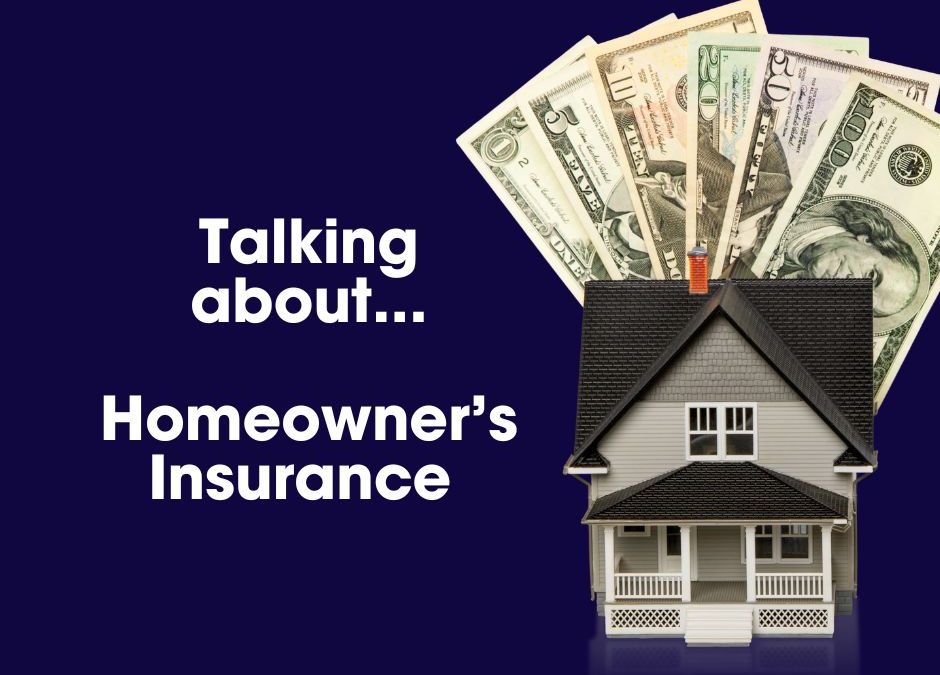
Homeowners Insurance in 2025: What You Need to Know
Experience Makes
The Difference
If you’re moving across town, from elsewhere in the state, or even relocating
across the country, I can help you find the perfect home!

The Difference
If you’re moving across town, from elsewhere in the state, or even relocating
across the country, I can help you find the perfect home!

We’re first-time home buyers. Where do we begin? (Part 4 of 4 – Last Chapter)
As you approach the final stretch of your home buying journey, it’s time to focus on the crucial steps that will bring you to the finish line. After months of searching, negotiating, and securing financing, you’ll need to ensure that all remaining documents are in order for your lender. This might include providing the latest pay stubs, bank statements, or any other documentation that the lender requires to finalize your mortgage. Additionally, securing homeowners insurance is a critical step that must be completed before closing. Start shopping for insurance early to compare coverage options and rates, ensuring that your new home is well-protected from the start. It’s also time to turn your attention to connecting utilities. Contact your local utility providers—such as electricity, gas, water, internet, and waste management—to set up new accounts and arrange for service activation.
Finally, as the closing date approaches, conduct a final walkthrough of the property, usually a day or two before closing. This walkthrough is your opportunity to verify that the property is in the condition agreed upon and that any repairs negotiated in the contract have been completed. Carefully inspect each room, test appliances, and ensure that everything is functioning as expected. If any issues arise, discuss them with your real estate agent immediately. On closing day, be prepared with a driver’s license or passport. Once everything is signed and the closing costs are paid, you’ll receive the keys to your new home, marking the completion of your journey and the beginning of a new chapter in your life. Congratulations on becoming a homeowner!
The Difference
If you’re moving across town, from elsewhere in the state, or even relocating
across the country, I can help you find the perfect home!

We’re first time home buyers. Where do we begin? (Part 3)
If you are following along, so far you have gotten pre-approved for your mortgage, researched and chosen a buyer’s agent to be your advocate, saved money for your down payment, shopped for a home and gotten one under agreement. Now the fun continues!
Once you have a home under agreement and have deposited your hand money, you will be ready to schedule your inspections. Your buyer’s agent should provide you with guidance in finding reputable home inspectors. You will want to consider scheduling a general home inspection as well as inspections for radon, wood boring insects (termites), mold, and possibly sewer lines, septic systems and wells. You generally have 10 – 14 days to complete your inspections. At the end of that period, you will need to make a request of the seller if you would like any items addressed. To reach a successful conclusion of negotiations, keep some simple tips in mind. First, you should have considered anything on the disclosure when you were making the offer – its not a great idea to revisit disclosed items. The same can be said for items you could have easily seen. If the inspector notes that the driveway is cracked and you should have seen it while visiting the home, asking for the seller to pay for a new driveway will also not be well received. So, when deciding what, if anything, to request of the seller, eliminate disclosed items and things you noticed when visiting the home and then turn your focus to the items that concern you most. Of course, if there were multiple offers and you were the winner in a bidding war, you may not be able to ask for much if anything as there is likely another buyer on standby! Ultimately, you and your seller will need to reach a compromise on the inspection issues and that agreement will be formalized in a written addendum to your Agreement of Sale.
At the same time you are working through inspections, you will also need to make application for your financing. This must be complete (in other words, you must have all of your paperwork to your lender) within 7 days of the final Agreement of Sale. Applying for a mortgage these days can seem quite challenging – be prepared for the lender to ask for what will seem like a mountain of documents. And do NOT make any major purchase until after you close on your home – changes to your outstanding debt at this point could affect your ability to qualify for a loan at all! Once you get through inspections and mortgage application, it should be smooth sailing. We will cover the final step in the process next time!
The Difference
If you’re moving across town, from elsewhere in the state, or even relocating
across the country, I can help you find the perfect home!

We’re first time home buyers. Where do we begin? (Part 2)
For those of who just picking up the conversation today, check out Part One to read my introduction to the home buying process. If you are following along, so far you have gotten pre-approved for your mortgage, researched and chosen a buyer’s agent to be your advocate, and hopefully saved money for your down payment. Now the fun begins!
Once you are pre-approved for a loan and have determined what price range you are comfortable shopping in, you can start your home search. Typically, this begins with an online search – your buyer’s agent should set you up to receive new properties as they become available. As interesting homes come on the market, you will want to tour them immediately. In most price ranges, we have an extreme shortage of inventory and those who snooze tend to lose. It is important to have seen enough properties upfront so that when you see the right one, you know it and are ready to make a move. When evaluating homes, it is also important to be realistic. There is no perfect home, so establish your list of criteria upfront. If a home achieves 7 out of 10 wish list items, in real estate we call that a home run. If you are going to hold out for all 10, a move is probably not in the cards for you in the short run.
Once you find a home that works for you, in this market you do need to anticipate a bidding war is a realistic possibility. Interestingly, even homes that have sat on the market for seemingly prolonged periods of time will often receive multiple offers, so do not delay in making an offer if you like a home. If there are multiple offers, do not assume you will get a second chance – work with your buyers offer to make the highest, “cleanest” offer that you can out of the gate.
Once you have a home under agreement and have deposited your hand money (anticipate 1%-5% of your purchase price depending on your price range), you will be ready to schedule your inspections. Next week I will talk more about inspections and how to get through them!
The Difference
If you’re moving across town, from elsewhere in the state, or even relocating
across the country, I can help you find the perfect home!

We’re first time home buyers – where do we begin?
Buying a home is one of the best choices you can make. Rather than paying money to your landlord so that he can be closer to owning an asset outright each month, when you make your monthly payment each month a portion actually goes to your benefit – when you sell the home someday, as long as the market is in a good place, that money is refunded to you (called equity) and you can use it to buy again. It is, in effect, a forced savings plan and over time you can amass quite a large amount of savings while you are simply doing what you would have done otherwise – paying for housing each month.
To buy a home, however, you must have two things to start: a down payment and good credit. There a host of specialty loan products for first time home buyers far too extensive to review here, but figure on saving no less than 2.5% of the purchase price for a down payment if you are able to use an FHA product or 10% if you are going to use a typical mortgage. Credit scores are also key. Again, there are many things you can do to help or hurt your credit as you prepare to buy your home. Do not open any new credit – don’t buy any new cars. Pay all bills on time. Even if you are not ready to buy yet, it’s a great idea to connect with a reputable local mortgage broker right away to make sure you are headed in the right direction. (I can help facilitate this connection for you).
When you think you are ready, start by finding a full-time buyer’s agent. A Buyer’s Agent is looking out for your best interests from the outset. Check the agent’s personal website, LinkedIn page, Google business page and professional credentials, review their references, and interview if you wish. Make sure you understand what the agent will do for you and be sure you have done your homework and are selecting the best agent for your needs. Buying a home may be your largest investment – choose the agent who represents you once you have done your thorough due diligence. Once you select an agent, you will need to sign two documents: a Consumer Notice, informing you of your rights, and a Buyer Agency Agreement, whereby you actually hire the agent to work for you.
If you have not already done so, you should work with your agent to get a mortgage pre-approval. The mortgage broker will review your assets, liabilities and credit and give you a written statement of how much you can afford to buy. This step cannot be skipped. There is no sense looking at homes you can’t afford.
With pre-approval in hand and agent on board, you are now ready to begin the home buying process…stay tuned – in two weeks I will continue to walk you through the process…it’s when the fun begins!
The Difference
If you’re moving across town, from elsewhere in the state, or even relocating
across the country, I can help you find the perfect home!

How do the interest rates affect my ability to buy a home? Should I wait for rates to come down before moving?
Interest rates directly impact the affordability of a mortgage, as they affect your monthly payments and the total cost of the loan. Higher interest rates lead to higher payments, which can limit the price range of homes you can afford. Conversely, lower interest rates reduce monthly payments, making it easier to afford a more expensive home.
However, waiting for interest rates to drop is probably not advisable. Real estate markets are dynamic, with home prices increasing over time. By waiting for lower rates, you will likely find that home prices have risen, negating any benefit from the lower rates. Additionally, the timing of rate changes is uncertain, and waiting could mean missing out on current opportunities. The interplay between interest rates and home prices means that delaying your purchase could lead to higher overall costs. Additionally, lower rates will bring more buyers to the market and if buyer demand outpaces supply (as it has been recently), waiting could result in fewer available options, higher competition among buyers and even higher prices.
It’s generally better to focus on your personal financial situation and housing needs rather than trying to predict market movements. If you find a home that fits your budget and meets your needs, buying now can provide stability and allow you to start building equity at today’s prices. Fixed-rate mortgages offer the advantage of predictable payments, and if rates fall in the future, refinancing can provide a path to lower payments. The key is to make a decision based on your personal circumstances rather than trying to time the market perfectly.
The Difference
If you’re moving across town, from elsewhere in the state, or even relocating
across the country, I can help you find the perfect home!

What are some common mistakes homebuyers make and how can I avoid them?
One of the initial mistakes homebuyers often make the mistake of not getting pre-approved for a mortgage before starting their home search. This oversight can lead to disappointment if they find a home they love but then discover they are not qualified to purchase it. To avoid this, it’s essential to secure pre-approval from a lender early in the process. This not only helps you understand exactly how much you can afford but also strengthens your position when you’re ready to make an offer, showing sellers that you are a serious and prepared buyer.
Another significant mistake is skipping the home inspection process. While this may seem like a good way to save money or make a more appealing offer in a competitive market, it can lead to costly repairs down the line. A professional home inspection can uncover hidden problems with the home’s structure, systems, and appliances that might not be obvious to an untrained eye. Always include a home inspection contingency in your purchase offer, which allows you to renegotiate or withdraw if significant issues are discovered. This not only provides peace of mind but also protects your investment.
Finally, buyers often fall into the trap of emotional buying, where the decision to purchase is heavily influenced by first impressions rather than practical considerations. While it’s important to have a connection to the home you buy, letting emotions override rational decision-making can lead to overlooking critical flaws or financial missteps. To combat this, always have a list of must-haves and deal-breakers for your new home, and stick to it during your search. Thoroughly weigh the pros and cons before making your final decision to ensure the home meets both your emotional and practical needs.
The Difference
If you’re moving across town, from elsewhere in the state, or even relocating
across the country, I can help you find the perfect home!

What are some cost-effective ways to increase the value of my property before putting it on the market?
Boosting the value of your property doesn’t always require significant financial investment. There are several cost-effective strategies that can enhance your home’s appeal and attract potential buyers at a low out of pocket cost. One approach is to focus on curb appeal. Simple yet impactful improvements such as freshening up the exterior paint (particularly the front door), mowing the lawn, trimming bushes, weeding your landscaping beds and adding potted plants or flowers can instantly elevate the first impression of your property. A well-maintained and inviting exterior not only attracts buyers but also sets the tone for the rest of the home tour.
Another cost-effective way to increase the value of your property is by making small changes to modernize its design aesthetic. Upgrading key features such as lighting fixtures, faucets, and cabinet hardware can give your home a modern and refreshed look without breaking the bank. Changing out worn or dated carpeting is also easy and reasonably cost effective/
Furthermore, don’t underestimate the power of a thorough cleaning and decluttering. Clearing out excess clutter, organizing closets, and deep cleaning surfaces can make your home feel more spacious, inviting, and well-maintained. This simple yet effective step allows buyers to envision themselves living in the space and highlights the full potential of your property.
By implementing these cost-effective strategies, you can increase the value of your property and attract more buyers, ultimately maximizing your return on investment when it’s time to sell. If you’d like advice specific to your home, whether you are considering selling this year or in five, please reach out to me!
The Difference
If you’re moving across town, from elsewhere in the state, or even relocating
across the country, I can help you find the perfect home!

Many of you may have already heard about the proposed settlement from the National Association of Realtors (NAR) in regard to commissions. Don’t believe the sensational headlines. Commissions have not been slashed nationwide! Our media has become so sensational in recent years! Here is what is going on and what you might be interested in knowing. The litigation, as I discussed in an earlier Ask Kathe (available at AskKathe.com), centered around Sellers offering to pay buyers agent commissions. As you can imagine, many buyers don’t have enough funds available to pay their agents themselves. Sotheby’s parent company, Anywhere, already settled its stake in the litigation and the fall-out to consumers was simply that we had to inform sellers of their options when it comes to offering compensation to Buyers Agents and buyers of their rights and obligations under a Buyer Agency agreement. So what does this new proposed settlement mean? If the settlement is accepted by the court, then as of July (or sooner if adopted by a multilist (MLS) service):
My colleagues report that in New York City, the most expensive city in our country, Sellers are still paying Buyers Agents as they have in the past. It will add an extra layer to your Buyer Agent’s job to ascertain those offers before taking you to see a home so that you can understand your potential liability. This should also wake the consumer up to stop blindly choosing agents, such as by pushing a “contact agent” button on a website, and take a minute to review agents’ websites online to learn about each agent’s qualifications and value proposition before signing up to be represented by them.
The Difference
If you’re moving across town, from elsewhere in the state, or even relocating
across the country, I can help you find the perfect home!

Are buyers now going to have to pay their own Realtors?
Some commentators have suggested that one of the results of the recent judgment in the real estate industry (currently under appeal) may be that buyers may have to pay their own agents. To clear up the confusion, many buyers who have enough available cash already do pay their own agent, and that is then subtracted from the offer price to result in a lower deed price for the home. This is nothing new – buyers are motivated to do this because this lowers the deed price for tax assessment purposes which can mean years of tax savings to the buyers. However, this tactic has previously been reserved for those with sufficient cash to cover their down payment, closing costs, and paying their agent directly.
Historically listing agents have shared the commission they receive with the buyer’s agent, resulting in a 2.5%-3.5% payment to the buyer’s agent. Conversations have recently shifted to whether sellers will continue to provide buyer agent’s with this commission. That is a conversation that each seller will need to have with their listing agent, but if they offer a low or no commission, buyers will need to be prepared to pay the commission to their agent, and some buyers may wonder where they will come up with the cash. The industry is anticipating that lenders may come up with creative ways to address this issue, but in the meantime, there are two simple alternatives if you find yourself with insufficient cash to pay your buyer’s agent.
First, we have always been able to request seller assist from a seller, which can be as high as 6% of the sales price. What this means is that the seller is giving the designated percentage of the sales price back to the buyer to assist them with their costs, thereby lowering the seller’s net proceeds. Second, it is permissible for a buyer to attach a PA state drafted addendum to the offer that indicates that the seller will pay the buyer’s commission liability to the buyer’s agent, again reducing the net to the seller.
One may wonder, why go through all of these machinations if the seller is going to effectively absorb the cost of the commission anyhow, and that is an excellent question. In the normalized market that we are currently operating in, most sellers are more than happy to effectively reduce their price by three additional percent if they can get their home under agreement and to the closing table, so why not just continue to offer the buyer’s commission out of the gate?
The answer likely lies in the fact that as willing most sellers are to leave 3% or more on the table to get a deal done, most sellers are also (at least initially) eager to take as much away from their home as possible and may view not paying a buyers agent’s commission as an addition to their bottom line. That said, we are no longer in a market where homes are getting multiple over-asking price offers in the first week, and so it is likely that most sellers are still going to have to offer to pay a buyer’s agent a commission when they list their home or entertain a buyer’s request for funds to pay that fee when they receive an offer in order to get the job done. This is because, despite some of the negative press you may have read about the value of a buyer’s agent, they actually play a very valuable role and no buyer should venture into a real estate transaction without one. More on that next week!
The Difference
If you’re moving across town, from elsewhere in the state, or even relocating
across the country, I can help you find the perfect home!

The high interest rates are discouraging to us and we are not sure we want to purchase – any thoughts?
The decision to buy a house, whether a first home or a new home, is one of the most significant financial choices many individuals will make in their lives. While rising interest rates may seem like a deterrent, there are compelling reasons why the current real estate landscape still offers tremendous opportunities for potential homebuyers.
Real estate has proven to be a strong long-term investment. Even with higher interest rates, purchasing a home today can lead to substantial equity growth over the years. Real estate has a history of appreciating in value, and buying a home now positions buyers to benefit from potential future appreciation. High rates are also holding some buyers back for the time being, which allows you an opportunity to buy with less competition.
While high interest rates can be a concern for those seeking mortgages, they also present an opportunity for buyers to secure a fixed-rate mortgage while rates are still relatively low by historic standards. A fixed-rate mortgage ensures stable monthly payments throughout the life of the loan, providing a sense of financial security and predictability that renting cannot. While rates may feel comparatively high, economists and financial experts predict that interest rates may continue to rise in the coming years. By entering the market now, buyers have the opportunity to secure a home and a mortgage at what are still relatively lower rates before they increase further. If they drop, you can refinance. But how long do you want to sit on the fence and miss out on opportunities while you hope for a miracle (2.65% will probably end up as a once-in-a-lifetime that we all need to move past, unless you simply never want to move)?
Homeownership also offers a range of tax benefits, such as deductions for mortgage interest and property taxes. These advantages can help offset the impact of higher interest rates, making homeownership more affordable in the long run. While interest rates may be higher, lenders are still offering a variety of financing options to suit different budgets and preferences. Buyers can explore loan programs, down payment assistance, and other resources that can help mitigate the impact of higher interest rates.
In the face of rising interest rates, the decision to buy remains an attractive option for those seeking stability, investment opportunities, and a place to call home. While it’s essential to consider the financial implications of higher rates, the potential benefits of homeownership, including equity growth, tax advantages, and personal satisfaction, can outweigh the short-term impact of slightly increased mortgage rates. Working with a knowledgeable real estate agent and mortgage professional can help buyers navigate the current market and make informed decisions that align with their long-term goals.
The Difference
If you’re moving across town, from elsewhere in the state, or even relocating
across the country, I can help you find the perfect home!

We are moving toward retiring and downsizing. Is there anything we should be thinking about as we move toward this goal?
One very important thing for you to consider is how you plan to pay for your retirement home. If you are thinking you want to finance your home with a mortgage, you are going to need an income stream that the lender can use to qualify you for the loan. Simply having a large bank account is not enough to get a mortgage – the lender will need to see that your assets are generating enough income to pay for the mortgage and associated home ownership costs. You may not have your assets invested in income producing investments and may instead be invested in appreciating assets. Lenders will not consider capital gains when qualifying you for a mortgage, although they will generally look at your social security income if you are receiving that. Many buyers are surprised by this issue, and find themselves retired with no regular income stream and unable (probably for the first time ever) to get a mortgage.
You do have options of course! You could plan your downsize move BEFORE you retire so that you still have your employment income stream that can be used to qualify for a mortgage. It is very important that you have not announced your retirement before purchasing the retirement home, however. The lender will verify your continued employment right up to your closing date, and if they here from your employer that you are retiring, you may lose your loan.
You could also plan to pay cash for your retirement home. If you plan to go this route, you will want to make sure you have saved sufficient funds. If you are planning to use your equity in your current home to buy your retirement home, you will need to consider how to bridge the gap between selling your existing home and buying the next one – there are many options available to you. If you are planning a retirement and a move, please reach out to me in advance – I can help you strategize for a successful transition on all fronts.
The Difference
If you’re moving across town, from elsewhere in the state, or even relocating
across the country, I can help you find the perfect home!

Is the real estate market repeating 2008 all over again?
Absolutely not! I know there is a lot in the news about real estate these days, and the high interest rates and corresponding buyer anxiety are likely the most significant factor influencing what you may be perceiving to be a slow down in our market, but this is not a repeat of 2008!
Currently, 39% of homeowners in the U.S. own their homes free and clear of all debt (a remarkable number) and another 29% have more than 50% equity in their homes. That’s a full 68% of homes that are in very “safe” equity positions – the risk of any significant number of foreclosures is very low, unlike 2008.
In 2008-2011, we had 11-12 months of inventory on the market at any given time. Today, nationally, we have approximately 1.5 months of inventory on the market, with even less locally. This is an incredibly important differentiator between then and now that indicates that we are not moving toward a housing crisis. In 2008 in our area we had about 13000 properties – now that number is closer to 3000.
Additionally, approximately 3million US households earning over $150,000 per year are currently renting, and the average-aged millennials are just starting to buy their first homes. This provides a steady stream or prospective buyers. All of these factors indicate that we are not slipping into a housing crisis – the higher interest rates have just paused some of the typical move-up, move-down, move-around buyers.
The Difference
If you’re moving across town, from elsewhere in the state, or even relocating
across the country, I can help you find the perfect home!

Can you explain what is going on in Allegheny with property tax assessments?
It’s big news! For property tax appeals in 2023, the PA State Tax Equalization Board has set the common level ration at 63.6%. This is dramatically less than the 81.6% in effect for 2022. What this means is that for homeowners appealing their property taxes in 2023, the tax assessment should be set at 63.6% of the property’s 2022 value. This is great news for people buying their homes in 2022. Buyers have grown accustomed to having their property tax assessment appealed after they purchase their home, and these increased assessments can dramatically impact the monthly cost of owning their homes. This often impacts the sale-ability of a home as buyers often worry about that their monthly payments might increase to, but with new common level ratio, it is a big break for new home buyers.
For example, a home selling for $1million in 2022 should have a tax assessment of $636,000, which is an outstanding possibility. Likewise, a home selling in 2022 for $500,000 should have a tax assessment of $318,000.
Of course, buyers in previous years could consider appealing their tax assessment as well. For example, if a home was purchased in 2021 for $500,000, applying the current year percentages, it might have an assessment of $408,000. We did see dramatic appreciation in 2022, so that home might be worth $550,000 today, but applying the 2022 ratio of 63.6% to 2022 value could result in an assessment of $350,000 which would generate potential tax savings of approx. $1500. Any recent homeowners may want to consult their tax advisors as to whether it makes sense to appeal their tax assessment based on this new information.
The potential concern here is for the taxing bodies. The services we all depend upon require tax revenues to be funded. With the potential erosion of tax bases, this new common level ratio will be a victory for new homeowners, but we may all end up paying more in taxes due to the increased millage rates that may be required to compensate for declining tax bases.
The Difference
If you’re moving across town, from elsewhere in the state, or even relocating
across the country, I can help you find the perfect home!

If you were simply refinancing an existing mortgage debt, you MAY be ok choosing an internet lender. You would just need to be very careful that, before you apply to refinance your loan, you receive from the lender a full disclosure of all the costs and not just the rates. Often times I see lenders have exorbitantly high fees connected with low rates. In a sense, you would be buying down your rate by paying high fees upfront. You would want to be sure to compare them on the same day to a couple of local lenders and understand what you are paying to get the quoted rates. The reason you must compare rates on a singular date is because rates go up and down continuously and a rate may seem lower simply because you called a particular lender on a date rates dropped.
Since you are buying a new home rather than refinancing, I do NOT recommend that you use an internet lender. They do not tend to be familiar with area norms and that can cause you more headaches than you can imagine. There is a long list of particularities to PA Agreements of Sale and the last thing you want to do is have your closing delayed (while your movers are standing at the curb) while you wait for your lender (who does not have a local presence that you can visit personally to address any issues) to sort things out. As they are not familiar with our Agreements and processes, internet lenders may also impose requirements on you that are not requirements generally imposed by local lenders that may disadvantage you later. Finally, internet lenders often do not understand that PA Agreements of Sale declare “time is of the essence” inside the contract – what that means to you is that if you miss your closing date because the lender isn’t ready to close, the seller does have the legal right to declare you in default, keep your hand money and sell the home to someone else.
When buying, why take a risk? Rely on your trusted Realtor to help you find a local lender who offers the most competitively priced loan products and delivers exceptional customer service. Realtors cannot accept referral fees from lenders, so you can be sure we are motivated only by knowing you will have an outstanding transaction. Feel free to reach out to me for help finding you the best local lender to meet your financing needs!
The Difference
If you’re moving across town, from elsewhere in the state, or even relocating
across the country, I can help you find the perfect home!

If you are a buyer, the real estate market offers you a great opportunity right now! Don’t be fooled by the higher interest rates – this is an awesome market for you to buy in! Why? Because all of the people who you would have been competing with are afraid of the interest rates and sitting by the sidelines. This allows you to have a competition – free opportunity to buy a home! Just six months ago, buyers would have been overjoyed to have an opportunity to buy a home without competition, to have had an opportunity to have had an offer accepted on the first home they offered on instead of their seventh, to have been able to purchase a home at asking price rather than asking price plus 10 percent! Do not miss this golden opportunity – there are some very nice homes available right now. You can refinance later with a convenient no cost refinance loan – get the house now! Once rates start to come back down, the buyers (who have all been sitting by the sidelines with you) will come racing back into the market, and bidding wars will be back. Make the smart move – buy now.
And as a side note, I do not feel we will see a “crash” in prices. Inventory remains at record lows and those homes that are selling continue to increase in their sales prices to new record highs, despite the increasing rates. This is not 2008 – I am not anticipating any “deals” to be had this spring – if anything the natural increase in the buyer pool we see every spring will boost prices because of the extreme lack of inventory. Feel free to reach out to me and we can strategize on how you can take the most advantage of the current real estate market while you still can!
A home’s value is set by the market. Value is always determined by what a buyer is willing to pay for your home. Many factors come into play in setting that value. Market value reflects quantitative factors such as: # bedrooms, # bathrooms, # garages, placement of garages (attached or integral), lot configuration (large and functional back yard? Cliff lot?), location of the home generally, age of roof, age of mechanicals. Market value also reflects more qualitative items: how updated is your home, and is it all new, or just refreshed? What is the floorplan (open concept?) What are your wall colors? There is always a range that value will land in, which we call the range of reasonable. There is no ONE price at which a home will sell. If there are many buyers seeking a home like yours, it will sell at the top of the range of reasonable. If there are not, it will take longer to sell and may sell a bit lower in the range. What the market does not consider in setting a value of a home is what you need from the home. In 2008, many homeowners had used their homes as ATMs and withdrawn large sums of money for educations, vacations and cars. When the market softened, there was not enough equity for them to be able to sell their homes and not be in a short sale situation. This fact, that a homeowner over-extended themselves on mortgages, is not the least bit relevant to market value. The market is also not going to consider what you plan to do next. If you plan to move to Los Angeles to be closer to family and are finding that the Pittsburgh market is not going to yield you enough to be able to buy in L.A., you will need to turn to other investments to make up any difference.
We are in a very robust market – your home is far more likely to garner more now – whatever that may be – than it could have in the past. Forecasters are also suggesting that values will soften by year end. My crystal ball is out for service, but what I can tell you is that every hot market eventually softens. Waiting out the market so that you can get a price that the market is unprepared to deliver at this time may have you waiting many, many years, and during that time you may need to invest even more in your home in order to deliver to the market what it needs in order to deliver an acceptable sale to you.
The Difference
If you’re moving across town, from elsewhere in the state, or even relocating
across the country, I can help you find the perfect home!

What impact do you think rising interest rates will have on the real estate market?
I can’t tell you how many years the Fed has been warning us that they are going to raise the interest rates, and then nothing happened. But now, it looks like it is finally happening. Less than one year ago, conforming loans with good credit could be procured at rates below 3% fixed. Now they have inched up to 3.75% for conforming loans. While these are still historically great rates, the days of mortgage interest rates in the 3% range appear to be gone and we are slowly inching upward.
What impact will this have on the market? Typically, when rates increase the market slows. Buying power decreases – a buyer will qualify for a smaller mortgage amount when rates are higher. Even if a buyer qualifies for a loan amount, they may not want to pay the added amount each month attributable to the higher rate. Many buyers are cognizant of how much they don’t have available to spend on quality of life purchases, such as dinners out, when they have larger mortgage payments. This boils down to the fact that they may be unwilling or unable to buy at a price they could have last year, and this could depress housing prices.
However, this is counterbalanced by the fact that we are in a market with record low levels of inventory, so it is highly unlikely that interest rates will have any effect on housing prices in the short run. If anything, rising rates should cause buyers to move quickly and lock in homes and mortgages before rates continue to climb. And this would be the most sensible short-term response to rising rates. Buyers – rates are actually going up! The time to act is now!
The Difference
If you’re moving across town, from elsewhere in the state, or even relocating
across the country, I can help you find the perfect home!

We are interested in diversifying our portfolio and purchasing rental properties – any thoughts?
The first thing to keep in mind when considering a rental property is how you intend to pay for it. Rental properties are investment properties and subject to different lending rules than the home that you live in. Therefore, a lender will expect that you put more down as a down payment on a rental property and you will pay a higher rate of interest. Typically, lenders are looking for no less than 20% down on your purchase. And of course until you establish yourself as a successful landlord, your income is going to need to be sufficient to support the mortgage on your primary residence as well as any debt on your rental investments.
The second thing you need to think about is what kind of tenant you are interested in renting to. If you are hoping to rent to a family who might be in town for a couple of years with a temporary job assignment, then purchasing an apartment building with one and two bedroom apartments is unlikely to attract the type of tenant you hope to find. In that scenario, you would be looking for a single-family home in all likelihood (or possibly a townhome) in a good school district such as Quaker Valley. If you are hoping to find young professionals, you might look for something closer to downtown that has a trendier vibe to it.
You also need to take a look at the return on investment that you are seeking from the property. You will need to consider how much you are putting down on the property, how much you were paying in interest on any mortgage that you take out, your property taxes, maintenance of the building, any homeowners association fees, and any utilities that might be the responsibility of the landlord (these are typically utilities that are not separately divided in the particular structure, such as water). Putting together a spreadsheet with all of the expenses and your expected income will help you to determine whether or not the anticipated net income is worth the risk of investment to you. Be sure to build in some vacancy months – most properties are not leased 100% of the time.
Finally, you need to give some thought to how you will manage the property. Are you going to hire a property management company to handle that for you, or will you be more hands-on? Who is going to handle maintenance requests when something goes wrong? The beauty of being a tenant is that if something breaks, it’s not your responsibility to get it fixed. But as the landlord, are you going to be taking care of the repairs and if not, do you have a reliable handyman on-call that is willing to handle those items for you. If you are planning for others to manage the property on your behalf, you will need to build those costs into your financial projections as well. If investment properties are something you would like to consider, feel free to reach out to me and we can discuss these opportunities further.
The Difference
If you’re moving across town, from elsewhere in the state, or even relocating
across the country, I can help you find the perfect home!

Surveys have shown that 33% of baby boomer and 64% of millennial home buyers have some level of regret when buying a home, and given the fast-paced market we have been in this year, it is easy to understand why. The leading regrets center around financials – buyer often worry they may not be able to afford the home. Other concerns include the house being mis-sized for their needs, or the location not being ideal. In this market it is important to strike a balance between achieving your dreams and actually getting a house. Inventory is very limited and has been for nearly two years, so holding out for your perfect location, or the precisely correct amenities, may keep you waiting on the sidelines for a very long time. However, there are many things you can do to avoid having financial doubts. Before you enter into a contract to purchase a new home, start with your budget. Make sure you have a realistic idea of how much cash you have available each month after income taxes. Even if a lender can “qualify” you for a mortgage, you may not feel the payments are affordable, depending on how much you need for your monthly “lifestyle” outside of housing. Ask your lender to do a deep dive into your financials and really understand what your monthly payment will be – this number will vary depending on your interest rate, taxes… As you consider whether or not to view a home, look at the taxes, including what they might increase to after you buy the home. Also consider the cost of property insurance as well as some of the costs lenders don’t look at such as utility costs, maintenance costs (this can be grounds, pools, or general household upkeep) and homeowner association fees. Finally, when considering a specific home, consider any deferred maintenance that will need to be attended to in the next 5 years, such as replacing old roofs or heating systems – these items all need to be added into your current budget. Once you have a good sense of what the actual monthly cost of a home will be, make sure that you are comfortable with what is left over. Being “house poor” for a very short term, such as if you are expecting a major promotion, is one thing. Stretching to your maximum affordability long term with no significant income adjustment, however, might start to feel tiresome when you can’t afford the vacations or entertainment that you have come to enjoy. Take the time to do the hard work up front and educate yourself on these factors and you will be far less likely to regret the home choice you ultimately make.
The Difference
If you’re moving across town, from elsewhere in the state, or even relocating
across the country, I can help you find the perfect home!

When it comes to personal finances, there is never a one size fits all answer. Financial advisors will often tell you that investing in the market will, over the long run, yield you a greater return than the interest rate you are paying on your mortgage (this has certainly been true in recent years what interest rates have been historically low). However, markets are unpredictable and unless you are leaving your funds in a savings account at a bank, there is no guarantee you will not have a negative return in the market (see, for example, 2008). Additionally, if you pay off your mortgage, you are not getting the tax benefits of the mortgage deduction (available for mortgages up to $750,000 in size).
However, the counter argument is equally, if not more, compelling for many people. Without a mortgage, you are freed from having to worry about whether you have enough cash each month to pay your mortgage. Without a mortgage, your monthly expenses will likely be significantly lower. This not only allows you peace of mind, but would also allow you more monthly cash to spend on things you want to spend on, whether they be trips, gifts, or just more “experiences.” If you ever sell your home, you will have a much larger nest egg to move to your next residence, whether it is to be closer to children or grandchildren in another location or whether it is into a retirement community (many of which do you have substantial deposit requirements). Finally, there is no “risk” to the return you will get by paying off your mortgage. You know what your interest rate is on your mortgage and how much of a savings you will get each month when you pay it down.
However, it is never advisable to completely deplete your savings just to pay off a mortgage. If paying off your mortgage would substantially reduce or eliminate your emergency fund, then it is not a good idea. If, however, you still have a few years until you retire and are able to pay down the mortgage at a significantly faster pace by increasing your monthly payment or by making a lump sum payment each year (perhaps designating a portion of a bonus that you receive toward your mortgage payment), tell me this is absolutely an option you should give some serious consideration to.
The Difference
If you’re moving across town, from elsewhere in the state, or even relocating
across the country, I can help you find the perfect home!

Do you have any tips on how to get through the mortgage process as smoothly as possible?
I certainly do! Below are a few pointers on what you should not do if you want your mortgage to move smoothly through the process! This is critically important these days when competition is more intense for homes!
Assuming that seems pretty straight forward to you, below are a few more choices some buyers make that make the process more difficult than it needs to be:
Take these pointers to heart and you will greatly simplify your mortgage process!
The Difference
If you’re moving across town, from elsewhere in the state, or even relocating
across the country, I can help you find the perfect home!